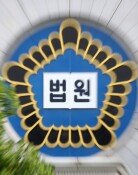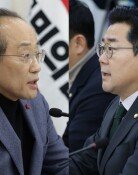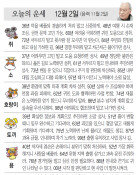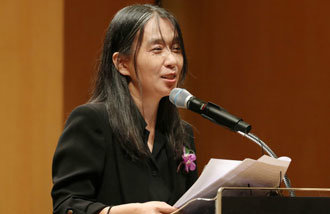Disappearing politics
Disappearing politics
Posted December. 02, 2024 08:13,
Updated December. 02, 2024 08:13
The situation of 'no politics' continues to worsen also in the 22nd National Assembly. The main opposition Democratic Party of Korea, the majority party in the National Assembly, has repeatedly railroad various bills, which have been followed repeatedly by President Yoon Suk Yeol's veto in a vicious cycle, while controversy over the opposition’s motion to impeach public officials such as the head of the Board of Audit and Inspection and prosecutors has become increasingly fierce.
President Yoon is expected to veto five bills, including the Grain Management Act, which passed the National Assembly with the Democratic Party's support, as early as this week. If he does, it will be the 30th bill he has sent back to the National Assembly in his two years and seven months in office. That number includes the Independence Counsel Act on (First Lady) Kim Keon Hee, which has already been passed by the National Assembly and vetoed by the president three times.
The Democratic Party of Korea plans to introduce an impeachment bill against Choi Jae-hae, the head of the Board of Audit and Inspection, on Monday, citing poor audits of the presidential office's relocation to Hannam-dong. It also plans to introduce impeachment bills against three other top prosecutors, including Seoul Central District Public Prosecutor Lee Chang-soo, for failing to properly investigate Kim Keon Hee, which will bring to 18 the number of Yoon administration officials the Democratic Party has targeted for impeachment. Following the National Assembly’s impeachment vote, the Constitutional Court started reviewing five of them, including Interior and Public Safety Minister Lee Sang-min, but the rest of the bills were rejected. Three have been dismissed by the Constitutional Court, and two are under review.
This is a phenomenon that has never been seen before. In the past, when politics worked on a limited basis, the ruling and opposition parties passed bills as consensually as possible, and it was highly unusual for a bill to be vetoed by the president. During the five-year terms of presidents since the '87 regime, the number of bills vetoed by the president has been kept in the single digits. This was possible because the president respected the spirit of consensus in the National Assembly. During the Kim Dae-jung administration, the opposition party controlled a majority in the National Assembly for all five years, but he never vetoed a single bill. President Syngman Rhee had the most vetoes (45), but his term in office lasted for 12 years.
There have also never been as many attempts to impeach top officials as now. There have been none or only one to four per president, and most of them have been dropped without a parliamentary vote. Impeachment motions by minority opposition parties were seen only as political gestures, and later downgraded to ‘motion to dismiss a minister’ instead of impeachment. The president had no obligation to dismiss a minister, but when the National Assembly passed such an impeachment motion, he usually replaced the minister. As a result, only three impeachment bills passed the National Assembly since 1987, including those against Roh Moo-hyun and Park Geun-hye.
The culture of compromise between the ruling and opposition parties and the president's respect for hard-won compromises seems to be a thing of the past. The ruling and opposition parties and the presidential office say they are “exercising their constitutional and legal powers.” But the politics of compromise is nowhere to be found now, with each side blindly asserting its own legislative and veto powers, while the purpose of the separation of powers - checks and balances - has all but disappeared. After all, it is up to the president to come up with a key to the political impasse. Still, he seems to have no solution even to the opposition’s demand to appoint an independent counsel against First Lady Kim, which is worrisome at best.
Headline News
- Companies race to build key connections with the Trump administration
- Trump's key figure advises against overinterpretation of Pyongyang’s actions
- OECD lowers Korea's 2025 potential growth below 2%
- Supreme Court confirms compensation for May 18 Gwangju movement victims
- Kim Sang-kyum wins first World Cup medal in Alpine snowboarding







